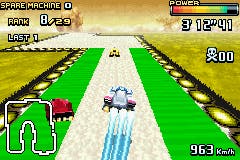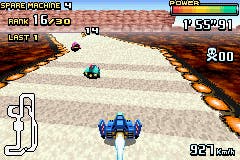F-Zero: GP Legend
From the house of Zero comes another hero. But is it worth your dinero?
Back on June 4th, when Nintendo released F-Zero: GP Legend in Europe, we remarked somewhat testily that we had no idea whether it was any good because Nintendo of Europe had failed to send out review code. And in the absence of the usual saturation coverage from the States (the game's not due out there for some months yet), and negligible marketing push from NOE, there was an unspoken assumption that GP Legend - derived from a Japanese anime - might be a slightly simpler, less significant entry in the series. A kind of F-Zero Lite. Something we weren't supposed to see.
It was pleasantly surprising then to find ourselves wrestling with a game that not only improves on previous handheld offering F-Zero: Maximum Velocity (which, despite some backlash from the hardcore, we genuinely found to be very enjoyable), but resurrects much of what was brilliant about F-Zero in the first place - back when it was the vanguard of SNES racing titles; fiendishly tricky, carefully balanced and absorbing. Okay, so 'rival' Mega Drive owners also gnashed their teeth in grudging admiration at its Mode 7 capacity, whereas the likelihood of that happening now is F-minus, but even at that it's a fairly handsome looking title for the Game Boy Advance.
Challenging

Key to our fondness for GP Legend is probably its variety. There's a standard Grand Prix mode, which consists of three Cups (five races each) at three difficulty levels, that reprise familiar tracks and design quirks, with an unlockable platinum cup that - let's try and be subtle here - ought to 'take you back' somewhat. Wink. [Ed shakes head.] But there's also a Story mode, which draws upon the Japanese anime (Falcon Densetsu, we think it was called), which sees you controlling a chap called Rick Wheeler (rather than mainstay Captain Falcon, though he's involved too), completing various challenges, and unlocking more of these challenge-based narrative threads whenever you meet new characters. The plot and segueing between characters is pretty daft, but fortunately matters on the track are much more convincing.
The challenges in Story mode are sometimes devilish, but the toughest are probably also the shortest. Already there are signs of a sensible balance, and the challenge-based approach extends into a full-on license test mode. Called Zero Test, it consists of 48 increasingly tough, mercifully brief tasks that will take hours of chipping away at to make progress. If you're like us, and derive tremendous satisfaction from replaying the same meticulously weighted task for hours on end, delicately refining your technique with each subsequent attempt until it crumbles and makes way, then Zero Test is heavenly. Obviously, for some, it won't be, but we reckon that softer racing fans probably know to steer clear of F-Zero in general by now.
As well as variety, GP Legend also has mechanical strength on its side. The controls have been refined slightly since Maximum Velocity, introducing a side attack mode that lets you bat at enemies by double-tapping a shoulder button, resulting in a small boost sideways to send them into the barriers, and changing the way cornering works. Here you're using shoulder buttons to lean in, but instead of rapidly tapping the A button, you often have to make use of the brake and put more thought into cornering. It gives the game the feel of older F-Zero spliced with more traditional racing values, and the first time you take a square-edged hairpin magnificently, exiting a subsequent turn with the faintest scrape of the power-draining barriers that line the course, you'll probably agree with us.
Tracking

The boosting has also been aligned with the N64's X and Cube's GX titles. You can't boost during the first lap, but you can thereafter, only when you do it's not simply one boost per lap, it's a gradual thing tied in to your power bar. In other words, you have to balance your desire to make headway up the field against the likelihood of your depleted power bar holding out until you reach the next recharge point. And speaking of balancing acts, another thing that GP Legend does is let you trade off acceleration for top-speed, and vice versa. When you select your craft - of which there are tens of unlockables - you not only have to take into account the base grip/body/boost statistics, but you then have to decide whether you'll settle for the best of both worlds, or whether the track you're facing would be better suited to a significant swing in the acceleration or top-speed departments.
Track designs will certainly make you think about this too. Although when you start out the Grand Prix mode is pretty easy, it's not long before you're in the familiar position of having to start over. And over. And being able to change the balance of your craft's power is a vital tool in refining your approach. Some fans were a little upset that Maximum Velocity didn't make more use of familiar tracks and locations, but they won't have that complaint here, and they won't have any complaints about the designs, either - some of them are bordering on labyrinthine, if not certainly Machiavellian with their movement changing strips, explosives and slidey liquid bits, and although you often run the risk of falling out of the race entirely by seeking them out, some of the shortcut leaps are exhilarating and ingenious.
Tracks even draw upon X and GX, again, and the rendition of the lightning track - complete with a wire mesh racing surface that you can see through at all times - is technically impressive if nothing else. We also rather liked the thick fog hanging over a couple of misty circuits, deliberately deployed to limit your view of what's to come - and forcing you to react very quickly whenever a boost pad happens into view.
Zeroic
Really, there isn't much to complain about. We could whinge that despite races supposedly consisting of 30 opponents ala GX, we can't remember seeing more than three of them on-screen at any one time, or even being overtaken by some of them for half of our time with the game. And we could point out, slightly more seriously, that there are occasions when we've fouled up a turn, collided with a barrier and bounced off rather fortuitously - even accelerating away rather quicker than we'd expect. It all balances out, particularly in the four-player link-up mode, but it still doesn't feel right.
Nevertheless, we very much like F-Zero: GP Legend. It's not perfect, it's a bit late to the party, there's a sense of déjà vu about some of it (particularly for F-Zero fanatics), and Nintendo's once again decided to limit single-cart multiplayer to one track (while multiple carts can do anything), but the mixture of task and race-based challenges, refined controls and delicately poised difficulty level are adequate compensation.

